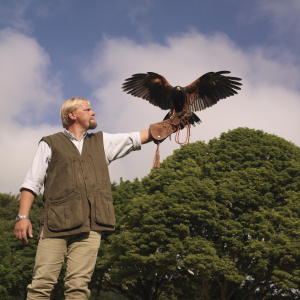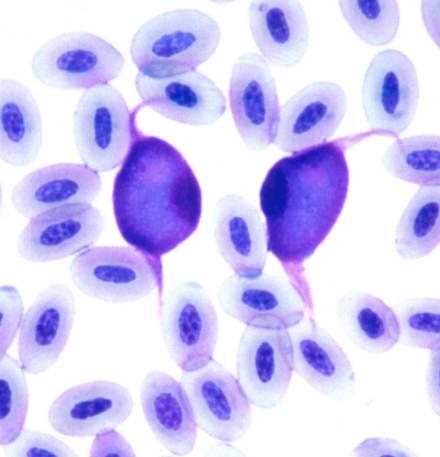Interactions
Mutualism
The
Red-tailed hawks are one of the most abundant birds in North America and are
known for their predatory skills and adaptive nature. The ability
to thrive so remarkably can be linked to how they're built, but also
through the use of outside forces for support and sustainability.
Red-tailed hawks and humans tend to have a mutualistic
relationship. What that means is that humans and Red-tailed hawks have
the ability to share a relationship that benefits both and harms neither
species. The Red-tailed hawks' benefit from the humans by creating more
nesting habitats and clearing the way for easier predation. Rodents tend
to populate where humans reside and with the path cleared from human
destruction, makes for an easy way for hawks to capture prey. Humans benefit from the Red-tailed hawks because they feast on pesky critters (mice and other
rodents) that bother or infest human households. Red-tailed hawks have
also been used for falconry or hawking by humans especially many Native
American tribes. Falconry is the use of trained raptors (hawks and
eagles) to hunt and provide game for human consumption.
benefit from the Red-tailed hawks because they feast on pesky critters (mice and other
rodents) that bother or infest human households. Red-tailed hawks have
also been used for falconry or hawking by humans especially many Native
American tribes. Falconry is the use of trained raptors (hawks and
eagles) to hunt and provide game for human consumption.
Competition
 Even
though the hawk’s life so far may sound like easy street, there will
always be competition between different species especially between other
birds that share the same qualities. Both the Red-tailed hawk and the
Great Horned Owl are extremely adaptive predators that can live in
diverse areas. Each species has a very broad diet, consisting of small
mammals, have the ability to nest almost anywhere and are very similar
in weight and build. Well you may be thinking, owls are nocturnal and
feed during the night, how can they pose a problem to the Red-tailed
hawk? Even though they may be on two different cycles, they still prey on
similar species and compete for nesting areas. Great horned owls have
even been known to occupy and claim other Red-tail’s nest. This sort of
relationship is called "competition" where two similar organisms try to
co-exist in the same environment. This leads to limited resources and
eventually will cause one species to depart and try to find another area
to inhabit.
Even
though the hawk’s life so far may sound like easy street, there will
always be competition between different species especially between other
birds that share the same qualities. Both the Red-tailed hawk and the
Great Horned Owl are extremely adaptive predators that can live in
diverse areas. Each species has a very broad diet, consisting of small
mammals, have the ability to nest almost anywhere and are very similar
in weight and build. Well you may be thinking, owls are nocturnal and
feed during the night, how can they pose a problem to the Red-tailed
hawk? Even though they may be on two different cycles, they still prey on
similar species and compete for nesting areas. Great horned owls have
even been known to occupy and claim other Red-tail’s nest. This sort of
relationship is called "competition" where two similar organisms try to
co-exist in the same environment. This leads to limited resources and
eventually will cause one species to depart and try to find another area
to inhabit.
Parasitisim
Being known as a predatory
species, the Red-tailed hawk is feared by many, but to others they are a
perfect host for reproduction and survival. Simulium canonicolum
or blackfly, is one species that have been known to cause mortality in
young hawks. This type of interaction is parasitism,
where one species
benefits while the other is harmed. These infestations can cause a Leucocytozoon infection or a blood protozoan that can cause anemia or
loss of red blood cells and body fluid.
Find out some fun facts about the Red-tailed hawk.


